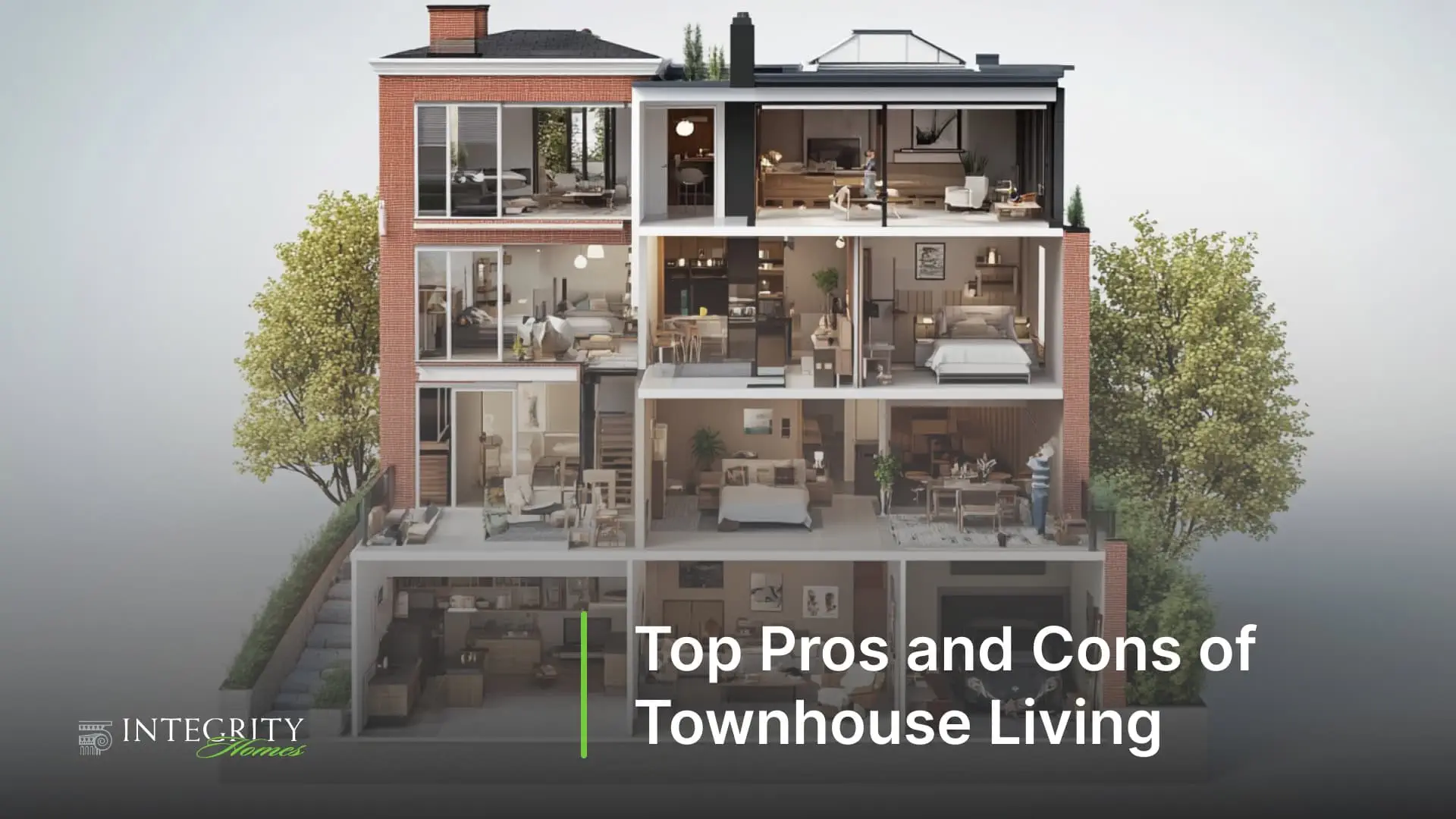
Thinking about buying a townhouse? This article covers the advantages and disadvantages of townhouse living. You’ll learn about key benefits like affordability and low maintenance, but also potential drawbacks like limited privacy and HOA fees. Read on to make an informed choice.
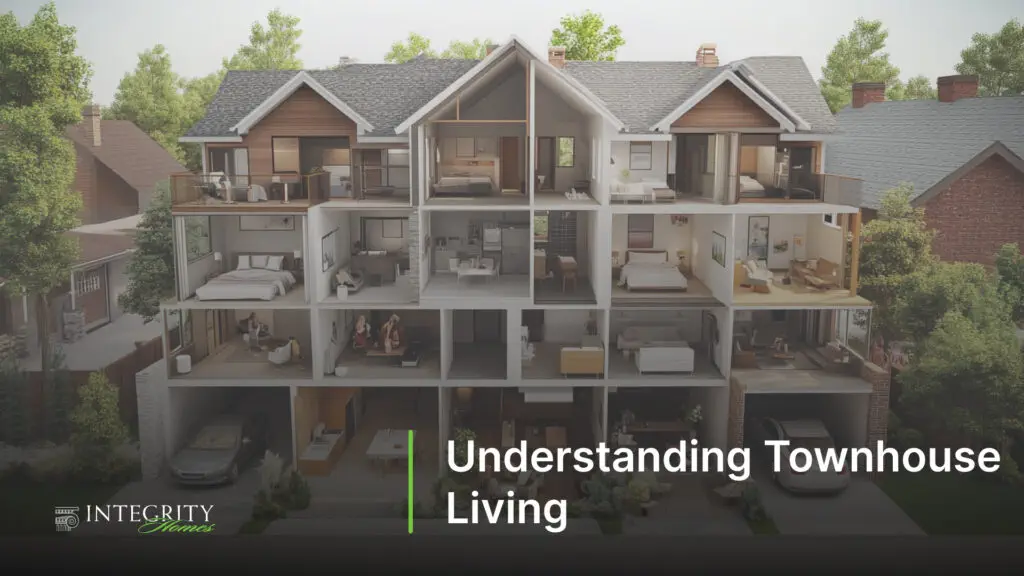
A townhouse stands as a unique type of single family home, typically aligned with comparable units and attached by one or two walls. These multi-storied residences are often designed to be slim and tall, allocating living spaces on lower levels while reserving bedrooms for the upper floors. Townhouses manage space effectively and usually come with modest-sized yards in both front and back, suitable for dense city environments as well as suburban areas.
The concept behind townhouse ownership blends individual property rights with aspects of community living. Townhouse owners possess not just their building, but also the land beneath it—this differs from condo residents who own merely the inside of their unit. With this greater authority over exterior features comes a shared responsibility through membership in a homeowners association (HOA). Townhouse communities frequently provide communal facilities like swimming pools, fitness centers, and playgrounds to foster neighborhood camaraderie.
Townhomes offer an added sense of safety owing to neighbors being within close reach—a factor that might appeal particularly to those drawn towards socializing within their immediate surroundings. Nevertheless, it’s advisable to weigh how suited this lifestyle is against your personal inclinations and daily life patterns before making such a decision.
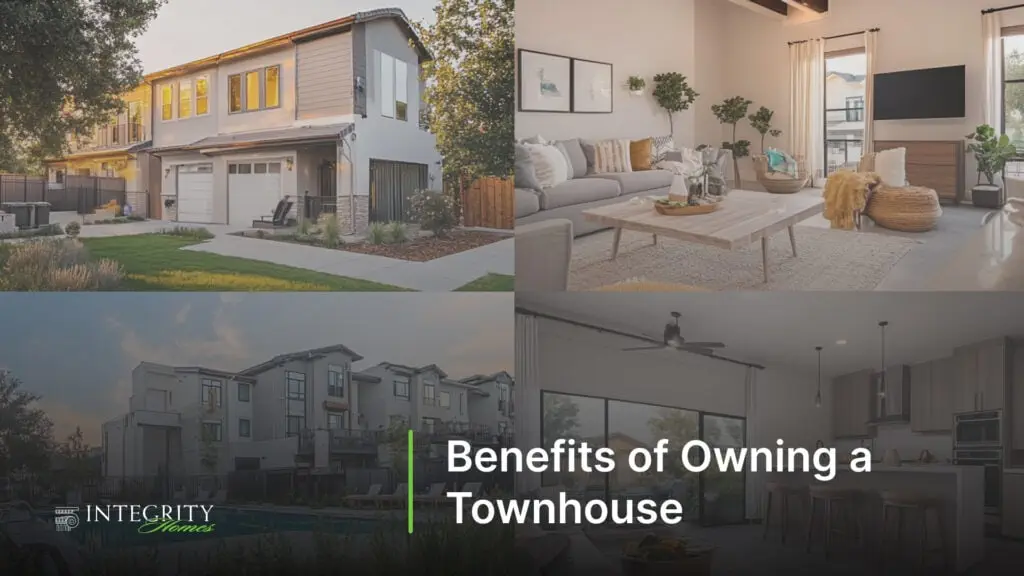
Having ownership of a townhouse presents numerous appealing advantages that captivate various purchasers. The blend encompasses aspects like cost-effectiveness and value, coupled with the ease of a maintenance-light living situation and the availability of communal facilities, making townhouses an optimal mix of convenience and coziness.
The following provides information on these benefits.
Owning a townhouse comes with the significant benefit of being affordable, making it an appealing option for those purchasing their first home or individuals looking for economical housing options. Townhouses often come with lower price tags than single-family homes. Prices can range from budget-conscious options to more upscale variants.
The reasonable cost of townhouses not only makes them attainable, but also has the potential to enhance property values and serve as a strong investment opportunity. Although resale value may fluctuate based on various factors and market conditions, choosing a townhouse is considered an astute move by prospective homeowners who wish to get the most out of their financial resources while avoiding excessive spending on housing.
The allure of townhouse living is strongly tied to the lesser burden of maintenance. In contrast to single-family homes, where owners are solely responsible for exterior upkeep, individuals who own townhomes typically enjoy the advantage of having HOA services handle tasks like landscaping, snow removal, and lawn care as well as maintaining the paint on their home’s exterior.
Because townhouses share walls between units, they often offer reduced expenses for heating and cooling. This aspect makes them particularly attractive to those whose lifestyles do not allow time for extensive home repairs or those who would rather invest their free hours in pursuits other than household maintenance. Townhome residents can take pleasure in their personal living space without bearing the full responsibility of caring for exteriors and common areas thanks to HOA management.
Numerous townhouse communities offer a range of shared amenities that enrich the residential experience. Amenities such as swimming pools, fitness centers, playgrounds, and tennis courts are commonly available within these developments, providing residents with easy access to recreational options right at their doorstep. These facilities not only promote active lifestyles, but also cultivate a sense of camaraderie among neighbors in townhome communities.
The concept of townhouse living skillfully combines the personal space and autonomy found in single-family homes with communal benefits typically seen in amenity-rich townhome neighborhoods. This hybrid model is particularly attractive for those seeking both social engagement and an energetic lifestyle within a community setting.
Many townhouse communities integrate natural elements like parks, walking trails, and various outdoor spaces into their design. This integration amplifies the allure associated with owning a townhouse by offering picturesque environments where homeowners can connect with nature without straying far from home.
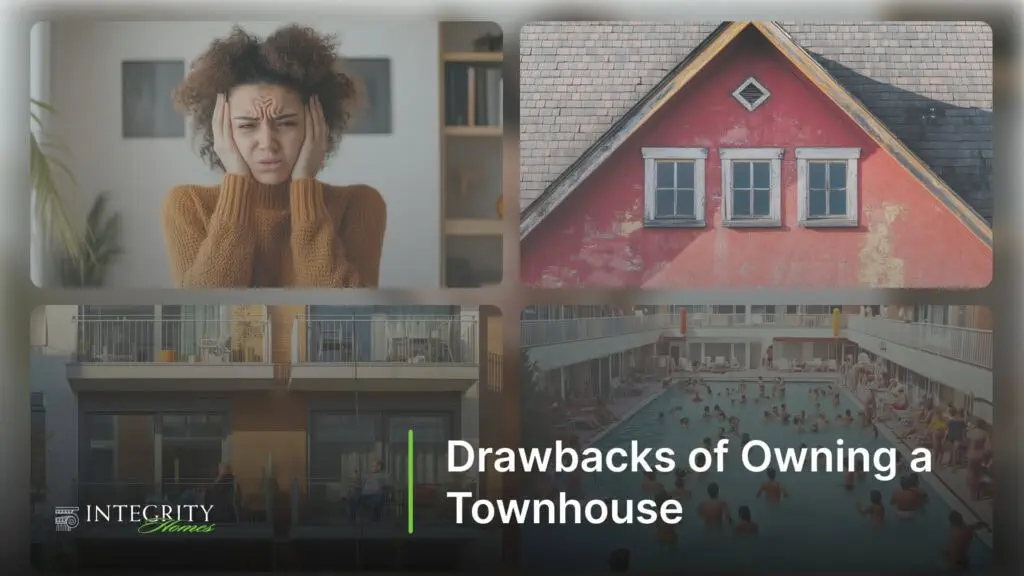
Townhouse living, while advantageous in various aspects, presents certain difficulties. The lack of privacy stemming from common walls and the monetary as well as regulatory restrictions set by homeowners associations are important factors to consider when owning a townhouse.
These represent some crucial drawbacks associated with residing in a townhouse.
One significant disadvantage of residing in a townhouse is the reduced privacy resulting from having shared one or two walls. Noise can readily pass between homes, creating possible disruptions due to neighboring activities. Such close quarters may lead to disputes concerning noise and communal areas, which might not be agreeable for all individuals.
Individuals who prioritize their privacy and desire more isolated living conditions might find the common walls and proximity to other residents inherent in townhouse living as notable negatives. It’s essential to assess your personal need for seclusion and determine if a townhouse aligns with your way of life.
Ownership of a townhouse can entail financial obligations and adherence to regulations enforced by homeowners associations, which might be considered a drawback. On average, the monthly HOA dues for townhouses hover around $200. This expense contributes to the total cost of residing in such homes over time. Although these fees typically fund upkeep and communal facilities, they could impose an economic strain on certain property owners.
Homeowner associations usually implement stringent policies regarding alterations to properties, garden landscaping, and external aesthetics that may restrict individual expression and inventiveness. It is essential for prospective buyers to thoroughly comprehend these rules and assess whether they are compatible with their own lifestyle preferences before making the decision to invest in owning a townhouse.
Typically, many townhouses do not increase in value as rapidly as single-family homes when considering a long-term investment. This reduced rate of appreciation may impact the overall potential for investment and resale value. It is crucial to conduct comprehensive research, as local real estate trends and market conditions play a significant role in determining property values before committing to the purchase of a townhouse.
Although purchasing a townhouse can provide an accessible way into homeownership due to its affordability, individuals who are aiming to optimize their return on investment should be wary about possible issues related to resale value. Before deciding on buying a townhouse, it is important for prospective buyers to thoroughly assess market trends and consider the long-term economic outcomes associated with such an acquisition.

Before making the commitment to buy a townhouse, it’s crucial to evaluate numerous essential aspects that align with your way of life, personal tastes, and fiscal goals. Considerations such as the property’s location and surrounding community, along with its floor plan and monetary consequences, are imperative in guiding you towards a well-informed purchase decision.
The positioning of a townhouse plays a critical role in shaping both your quality of life and the value of your investment. Being close to amenities such as shopping centers, medical services, public transit options, educational institutions, leisure spaces and neighboring properties is essential. It’s also important to consider factors like the safety record, cleanliness standards and any prospective development projects within the area when looking for property that will stand the test of time.
Opting for townhouse living can often cultivate a vibrant community atmosphere among residents, which adds value to daily interactions. To aid in selecting an ideal neighborhood before committing to purchase a home, resources such as Homes.com’s main page or its ‘Explore Great Neighborhoods’ feature are invaluable tools at one’s disposal.
When selecting a townhouse, it’s essential to ensure that its floor plan and square footage align with your lifestyle requirements and personal tastes. Critical aspects such as the choice between open areas or enclosed rooms, ample storage capacity, and an adequate count of bedrooms and bathrooms should be thoroughly evaluated. Townhouses typically feature multi-level designs which provide unique living spaces suited to diverse preferences among potential homeowners.
It is important to evaluate if the indoor living space along with any outdoor space fulfills your demands. A private outdoor space can significantly elevate the quality of life within a townhouse by providing the feel of a detached home.
Grasping the full spectrum of expenses involved in owning a townhouse is essential for sound financial planning. These expenses encompass property taxes, insurance, varying HOA fees—which can have a substantial effect on total affordability—and costs for maintaining the interior.
Prospective townhouse purchasers must also be mindful of fiscal commitments that arise during the acquisition phase, including setting aside funds for both down payment and closing costs. Since lenders will evaluate your monthly income, existing debts, and HOA fees when determining eligibility for a mortgage loan, it’s imperative to have an accurate grasp of your finances prior to embarking on buying a townhouse.
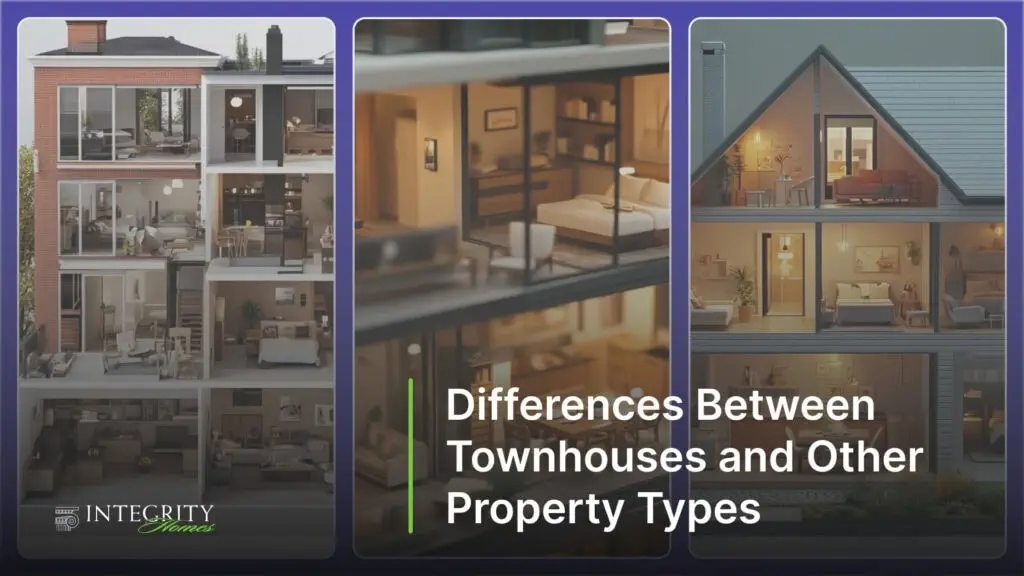
Grasping the distinctions between townhouses, condos, and single-family homes is crucial when making a well-informed housing choice.
Evaluating these residential forms underscores their distinctive characteristics and factors that potential homeowners should take into account.
There are similarities between townhouses and condos, but they differ in significant ways. Owners of townhouses usually possess more authority over their premises, as well as the land upon which the structure resides, unlike condo owners who hold ownership solely within their unit’s walls. This allows those who own a townhouse more liberty when it comes to altering or renovating their home.
In terms of construction, while both types of homes may share common walls with neighboring properties, a key distinction is that a townhouse does not have other units situated above or below—contrasting with many condos that can be flanked on several sides by other living spaces. The layout of townhouses tends to offer residents an enhanced sense of autonomy and seclusion due to fewer communal areas. This feature often attracts individuals looking for greater control and privacy in their living arrangement.
Townhouses and single-family homes present distinct lifestyles and investment opportunities. Single-family homes, usually standalone structures, provide a greater level of privacy and space than their attached townhouse counterparts. This enhanced seclusion is important for individuals who prioritize private living conditions.
On the other hand, owning a single-family home typically entails increased maintenance duties and expenses. In contrast, townhouses offer shared upkeep amenities and are often less expensive to acquire, making them an appealing option for numerous purchasers in terms of affordability and ease.
When making your choice between these two types of residences, it’s crucial to balance the advantages that come with more personal space against those provided by the practicality and cost-effectiveness associated with townhomes.

Deciding if a townhouse aligns with your needs hinges on considerations such as your way of life, tastes, and economic status. The distinctive combination of neighborliness, practicality, and cost-effectiveness found in townhouse living is attractive to numerous prospective homeowners due to the benefits provided by communal amenities coupled with lesser upkeep demands.
When scrutinizing various choices for a townhouse, take into account aspects like its size and design plan including how many bedrooms and bathrooms there are alongside consideration for storage capacity. Should the economical aspect appeal to you along with minimal maintenance requirements and access to shared facilities match up well with what you desire from a lifestyle standpoint. Then opting for a townhouse might just be an ideal decision.
Townhouse living provides various advantages, such as being cost-effective, requiring less maintenance, and offering shared amenities within the community. Nevertheless, this lifestyle can also include certain downsides like reduced privacy and the obligation of HOA fees. Prior to committing to a townhouse, it is crucial to consider factors such as its location, floor plan design, and economic considerations.
Deciding if a townhouse suits you largely hinges on your personal life choices and inclinations. An in-depth examination of the positives and negatives will help guide you towards an informed decision that meets both your desires and aspirations. Seize the chance to discover a residence that perfectly blends autonomy with community living benefits.
Possessing a townhouse presents an economical option, necessitates minimal upkeep, and provides entry to shared facilities, which collectively render it an appealing selection for numerous homebuyers.
The combination of these benefits leads to a comfortable and pleasurable residential lifestyle.
With townhouse ownership, one has rights to both the structure and the land it sits on. This grants owners more freedom to make changes to their property. On the other hand, owning a condo usually means only having possession of the interior space within communal buildings.
This crucial distinction influences how much control and accountability each owner possesses in relation to their residence.
Living in a townhouse often results in limited privacy from shared walls and potential financial and regulatory restrictions enforced by homeowners associations.
These factors can significantly impact your living experience.
Before purchasing a townhouse, it is essential to evaluate the location and neighborhood, the floor plan and square footage, as well as the financial aspects, including HOA fees and property taxes.
These factors will significantly impact your living experience and long-term investment.
Townhouses generally appreciate at a slower rate than single-family homes, affecting their long-term investment potential.
Therefore, if maximizing resale value is a priority, single-family homes may be the better choice.
Maryland | Frederick, MD | National Harbor, MD | Potomac, MD
Virginia | Alexandria, VA | Fairfax, VA | Lorton, VA | Northern, VA | Stafford, VA | Stephenson, VA | Winchester, VA | Washington DC